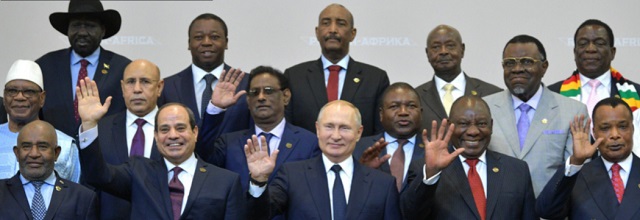
What the Euro-Asian nation promised African countries at a historic summit in Sochi
Kampala, Uganda | ISAAC KHISA AND JULIUS BUSINGE | One might have probably heard about Sochi, Russian city located on the Black Sea Coast near the border with Georgia, for co-hosting the 2018 FIFA World Cup.
But the quiet resort city with merely 300,000 people – equivalent to a fifth of Kampala’s population, captured global attention again, this time for hosting the first ever Russia-Africa Economic Summit from Oct.23-24.
The historic meeting marked the beginning of renewed relations between Russia and Africa. The Euro-Asian nation, which had a strong influence in Africa alongside US and China, had frozen its relations with the African continent following the collapse of the Soviet Union (USSR) in 1990s.
This created the opportunity for its rivals China, US, China, India and EU to strengthen their position on the continent as the true trading partners.
But the continued isolation of Russia from meddling into the internal affairs of other sovereign states by the west has forced Russia’s President Vladimir Putin to return to the continent to boost its trade volumes.
Russia’s trade volumes with Africa has doubled over the past five years to US$20bilion, but Putin says that needs to be doubled in the next five or so years.
However, its rival US had its trade volumes with Africa at $39billion in 2017, making it Africa’s third-largest trading partner behind China and the European Union, according to the figures compiled by the U.S. agency USAID.
On the other hand, the value of China-Africa trade in 2017 was $148 billion, down from a high of $215billion in 2014. India-Africa trade volume stood at US$62bn for the 2017-18 year, representing a 22% growth.
As such, Putin, whose country dominates in the sale of military arms in Africa, has pledged to work with the various African states to upgrade their transport infrastructure, develop telecommunication and digital technologies, provide information security as well as offer advanced technologies and engineering solutions.
He said Russian companies will also further assist African countries in developing national healthcare, ensure broad access for all segments of the population to qualified medical care and strengthening Africa’s capacity to deal with epidemics.
He also revealed that Russia is participating in an initiative to ease the African countries the debt burden. He said the debt write-off now stands at US$20bn.
“I want to emphasis that such work is absolutely beneficial, since it also gives Russian companies the opportunity to work in the African market, interact with the African partners and receive appropriate benefits in the interests of the Russian Federation and its citizens,” he said.
He said Russia is currently among the top ten suppliers of food to the African market, with product range of counter trading expanding, and the share of non-resource – agricultural and industrial – products increasing.
Russia is now exporting more agricultural products than weapons to the markets of third world countries, in which weapons now account for $15billion and agricultural products nearing $25billion in sales exports, according to the Russian government.
Bilateral meetings
On the sidelines of the summit, Putin also held bilateral meetings with various African heads of state including Uganda’s Yoweri Kaguta Museveni, South Africa’s Cyril Ramaphosa, Ethiopia’s Abiy Ahmed and Central African Republic’s, Faustin-Archange Touadéra to discuss areas of collaborations.
And like all other presidents who held the bilateral talks, President Museveni said the summit was long overdue given that Russia had similar conferences with India, China, Turkey and Japan.
He, however, said the defense and security needs to be one of the areas of collaboration with Russia owed to its strong military muscle.
“We have been cooperating very well, ‘you’ have supported in building an army by buying good Russian equipment, aircrafts, and so on. We want to buy more,” he said.
“We have been paying cash in the past, cash, cash, cash. And this slows down the pace, because we must have cash to pay. What I proposes is that you supply and we pay,” Museveni added.
Majority of the head of states, however, urged the Russian companies to consider investing in their mineral resources such as diamond, uranium, zinc, gold, copper, and iron ore, among others, to create jobs to their citizens and boost their economies.
Alongside the summit were trade exhibitions where Russian companies and investors to showcased their potential to boost the strategic partnership.
Russian companies, for instance, showcased their different military hardware, medicine, car manufacturing, and nuclear energy, agriculture, security, and information and communication technology, among others.
However, a handful of African countries including Kenya and Morocco showcased their products that mainly included agricultural. Already, Kenya exports tea to Russia.
 The Independent Uganda: You get the Truth we Pay the Price
The Independent Uganda: You get the Truth we Pay the Price



